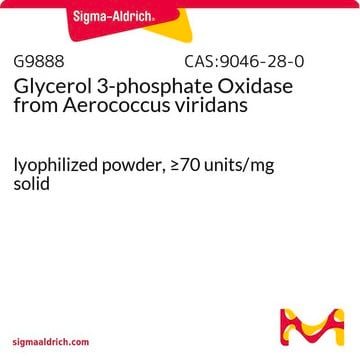G7886
sn-Glycerol 3-phosphate bis(cyclohexylammonium) salt
≥93% (GC)
Synonym(s):
L-α-Glycerol phosphate bis(cyclohexylammonium) salt, L-α-Glycerophosphate bis(cyclohexylammonium) salt
About This Item
Recommended Products
assay
≥93% (GC)
form
powder
impurities
<9% water (Karl Fischer)
color
white
solubility
water: 50 mg/mL, clear to very slightly hazy, colorless
storage temp.
−20°C
SMILES string
NC1CCCCC1.NC2CCCCC2.OC[C@@H](O)COP(O)(O)=O
InChI
1S/2C6H13N.C3H9O6P/c2*7-6-4-2-1-3-5-6;4-1-3(5)2-9-10(6,7)8/h2*6H,1-5,7H2;3-5H,1-2H2,(H2,6,7,8)/t;;3-/m..1/s1
InChI key
FWIDSLORBURWJY-CFMHHUGTSA-N
Looking for similar products? Visit Product Comparison Guide
Related Categories
Application
Biochem/physiol Actions
Other Notes
Storage Class
11 - Combustible Solids
wgk_germany
WGK 3
flash_point_f
Not applicable
flash_point_c
Not applicable
ppe
Eyeshields, Gloves, type N95 (US)
Certificates of Analysis (COA)
Search for Certificates of Analysis (COA) by entering the products Lot/Batch Number. Lot and Batch Numbers can be found on a product’s label following the words ‘Lot’ or ‘Batch’.
Already Own This Product?
Find documentation for the products that you have recently purchased in the Document Library.
Customers Also Viewed
Our team of scientists has experience in all areas of research including Life Science, Material Science, Chemical Synthesis, Chromatography, Analytical and many others.
Contact Technical Service













